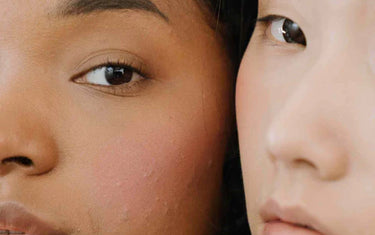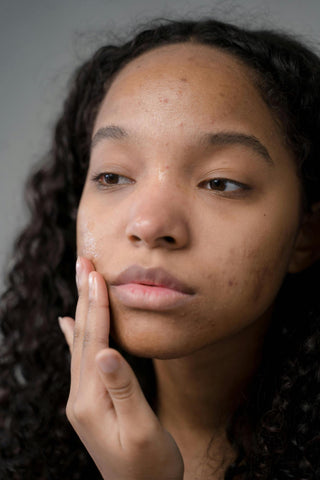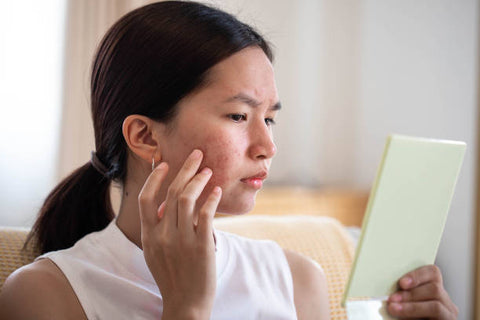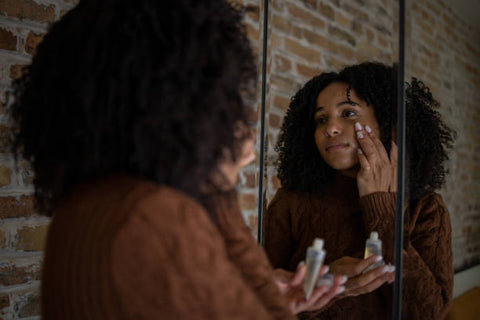8 min read / 1 March 2024 / yasmin sharp
The Best Essential Oils for Treating Acne
Discover the most effective essential oils for acne and how to use them safely.
Share this post

People with acne may find themselves trying a whole host of treatments to calm the condition, with some proving to be more successful than others.
Some believe that using essential oils for acne can help to reduce its appearance, and whilst they cannot cure the condition, there are several oils that contain potentially beneficial properties that can make it easier to manage.
We take a closer look at the best essential oils for treating acne, to give you a better idea of where to start your natural treatment journey.
Can I use essential oils for acne?Research has found that inflammatory acne lesions can be effectively reduced through the topical application of essential oils. [1] However, they shouldn’t be viewed as a ‘cure all’ for the condition, and they work best as a supplementary treatment alongside any medication you may have been subscribed. When using essential oils for acne, you should always dilute using a carrier oil before application, as this helps to safeguard the skin. The correct dilution ratio is 1 teaspoon of carrier for every 2-3 drops of essential oil. Everyone has different skin types, so not every essential oil will be suitable for you, but with a little experimentation you may find one or two that help you to combat and control acne breakouts. |

What are the best essential oils for acne?
If you want to use essential oils for acne treatment, you could try some of the following:
1. Basil oil is packed with anti-inflammatory properties
Several studies have been conducted that take a closer look into the benefits of using basil oil for acne.
One study in 2012 tested various types of basil sourced from around the world and found that it could contain anti-inflammatory properties. [2]
Whilst a later study from 2017 indicated that it may work as an anti-inflammatory, antifungal and antibacterial agent. [3]
In practical terms, you could use a diluted basil essential oil solution on your skin to soothe redness and calm inflammation around affected areas to reduce the appearance of acne.
2. Thyme oil shows signs of combating acne-causing bacteria
Thyme is a big favourite for many when it comes to cooking, but it potentially has much more to offer outside of the kitchen.
Although the results are only based on test results, researchers have found that thyme may be able to effectively kill the bacteria responsible for acne. [4]
Using a thyme essential oil tincture (a solution soaked in alcohol), they learned that compared to standard concentrations of benzoyl peroxide (which is often used in anti-acne washes and creams), it had a greater antibacterial effect.
3. Tea tree oil can ease acne and heal wounds
Not only does tea tree oil contain anti-inflammatory properties, but it also contains antiseptic and antimicrobial qualities.
For many, this is the go-to option for natural acne treatments, and the science world has also conducted some research that further qualifies its potential.
For example, in 2018, researchers found that when tea tree oil was combined with propolis and aloe vera, it proved to be more effective than the topical application of topical antibiotic erythromycin cream. [5]
4. Oregano oil can be even more effective than thyme
Oregano and thyme often go hand-in-hand, and similar to the effectiveness of thyme, researchers have previously found that oregano could be an even better option for acne.
This is based on a 2018 study, with oregano essential oil tested against two major acne-associated bacteria - P. acnes and Staphylococcus epidermidis. [13]
The results showed that oregano was even more effective than thyme, so using a diluted mixture to tackle acne spots may help to clear up pimples.
5. Rosehip oil contains nutrients that can keep acne at bay
Although rosehip oil is used as a carrier oil to make it safe to use essential oils on the skin, it also packs a punch when it comes to combating acne.
This is because it contains nutrients like linoleic acid, which can help to manage sebum production.
If your skin does not have enough linoleic acid, it could become increasingly oily as more sebum is produced to compensate.
Rosehip oil also contains vitamin A, which can be useful in keeping sebum production to a minimum.
It also contains a healthy amount of vitamin C, which has properties that can help to boost collagen and cell turnover, lower inflammation and work to reduce the appearance of acne scars. [6]

6. Lavender oil is used to sooth a variety of skin conditions
Lavender oil is one of the most researched essential oils, and aside from its widely known benefits as a mild sedative, it can also be effective at treating skin conditions like atopic dermatitis.
Research also suggests that topical application of lavender oil could help to heal skin blemishes and prevent scarring from acne.
In an animal study conducted in 2016, researchers learned that tissue regeneration and collagen production could be increased through use of lavender essential oil. [7]
This was especially true when applied at the start of scar treatment, which could eventually lead to smoother, blemish-free skin.
7. Eucalyptus oil can be a good choice for painful acne
The anti-inflammatory properties contained in eucalyptus oil could make it an ideal natural treatment for soothing particularly painful types of acne.
Based on the results of a study published in 2012, researchers believe that eucalyptus could boost the water-holding capacity of the skin, increase ceramide production, and improve the skin barrier’s resilience. [8]
This may be partly why eucalyptus extract is so often featured in anti-dandruff products.
8. Lemongrass oil is both antibacterial and anti-inflammatory
Our list contains several essential oils that contain anti-inflammatory properties and another one to consider is lemongrass oil.
There is a possibility that using a diluted mixture of lemongrass oil could help to reduce acne-induced inflammation, as studies have found that it contains compounds that could have a potent effect. [9]
Researchers found that it is both antifungal and anti-inflammatory, so topical application could help to ease inflamed skin and give you more control over acne breakouts.
9. Bergamot oil’s natural properties could be beneficial for skin
Like lemongrass, bergamot oil is part of the citrus family and also contains natural properties that can be beneficial for soothing acne.
A scientific review published in early 2024 focussed on bergamot’s byproducts and the inflammatory benefits they could contain. [10]
It concluded that based on a significant amount of evidence, bergamot could be used as a powerful and reliable resource to manage a variety of ailments that cause inflammation.
10. Garlic oil may be ideal for topical application
In 2011, a scientific review took a closer look at the dermatological potential of garlic, which included clinical trials, animal studies and laboratory studies. [14]
They found that garlic extract contained wound-healing and antimicrobial effects, adding that it may also be effective at treating warts, corns, psoriasis, alopecia areata and fungal skin infections.
Whilst there is currently no direct scientific evidence that garlic oil can be effective as an anti-acne treatment, research has discovered it does contain anti-inflammatory properties, so topical application could help to ease some symptoms. [11]

How to safely use essential oils for acne
Before applying any essential oil to your skin, you should always dilute it with a carrier oil and follow the correct mixing guidelines.
Essential oils are packed with natural properties that can be beneficial for skin, although they are highly concentrated and can cause irritation when used in their pure form.
People who should avoid using essential oils without consulting a doctor include:
- Anyone who is pregnant or breastfeeding
- Older adults
- Children younger than 12 years of age
- Anyone with health concerns (such as low immunity, high blood pressure or epilepsy)
Do not apply essential oils for acne on irritated or broken skin and if you experience any irritation, stop using them immediately.
If you are using an essential oil for the first time, it is advisable to complete a patch test, as this will give you a clearer idea of its suitability for your skin.

FAQs about using essential oils for acne
Can I use peppermint oil for acne?
Currently, there is no scientific evidence that supports using peppermint oil for acne.
However, some people may find that it has a cooling effect that soothes the skin, which can calm irritable pimples.
Peppermint oil does contain antibacterial properties, which may also prove to be helpful. [12]
Can I use essential oils for acne scars?
The natural properties contained in lavender essential oil and rosehip oil could make them suitable for treating acne scars.
More scientific research is needed to identify the full potential of these oils as acne treatments, but anecdotal evidence suggests they could be beneficial.
Which essential oils for acne should I avoid?
Comedogenic oils are generally not suitable for treating acne, as they can clog up pores and increase the size of the outbreak.
The likes of olive oil and coconut oil should be avoided for this reason.
Whenever you apply essential oils for acne, keep a close eye on your skin to ensure you are not experiencing any negative reactions.
[1] Renata Nurzyńska-Wierdak et al. (2023) Essential Oils in the Treatment of Various Types of Acne—A Review https://www.ncbi.nlm.nih.gov/pmc/articles/PMC9824697/
[2] Ané Orchard et al. (2017) Commercial Essential Oils as Potential Antimicrobials to Treat Skin Diseases https://www.ncbi.nlm.nih.gov/pmc/articles/PMC5435909/
[3] Syeda Khair Ul Bariyah et al. (2012) Ocimum Basilicum: A Review on Phytochemical and Pharmacological Studies https://www.researchgate.net/publication/274286672_Ocimum_Basilicum_A_Review_on_Phytochemical_and_Pharmacological_Studies
[4] Dr Margarita Gomez-Escalada (2012) Thyme may be better for acne than prescription creams https://www.sciencedaily.com/releases/2012/03/120327215951.htm
[5] V Mazzarello et al. (2018) Treatment of acne with a combination of propolis, tea tree oil, and Aloe vera compared to erythromycin cream: two double-blind investigations https://www.ncbi.nlm.nih.gov/pmc/articles/PMC6298394/
[6] Inés Mármol et al. (20017) Therapeutic Applications of Rose Hips from Different Rosa Species https://www.ncbi.nlm.nih.gov/pmc/articles/PMC5485961/
[7] Hiroko-Miyuki Mori et al. (2016) Wound healing potential of lavender oil by acceleration of granulation and wound contraction through induction of TGF-β in a rat model https://bmccomplementmedtherapies.biomedcentral.com/articles/10.1186/s12906-016-1128-7
[8] J Ishikawa et al. (2012) Eucalyptus increases ceramide levels in keratinocytes and improves stratum corneum function https://pubmed.ncbi.nlm.nih.gov/21696405/
[9] Mohamed Nadjib Boukhatem et al. (2014) Lemon grass (Cymbopogon citratus) essential oil as a potent anti-inflammatory and antifungal drugs https://www.tandfonline.com/doi/full/10.3402/ljm.v9.25431
[10] Caterina Russo et al. (2024) Bergamot Byproducts: A Sustainable Source to Counteract Inflammation https://www.mdpi.com/2072-6643/16/2/259
[11] Jung-Hye Shin et al. (2013) Short-term heating reduces the anti-inflammatory effects of fresh raw garlic extracts on the LPS-induced production of NO and pro-inflammatory cytokines by downregulating allicin activity in RAW 264.7 macrophages https://www.sciencedirect.com/science/article/abs/pii/S0278691513002287
[12] Rong Liang et al. (2012) Physical and Antimicrobial Properties of Peppermint Oil Nanoemulsions https://pubs.acs.org/doi/10.1021/jf301129k
[13] Mohammed H. Taleb et al. (2018) Origanum vulgare L. Essential Oil as a Potential Anti-Acne Topical Nanoemulsion—In Vitro and In Vivo Study https://www.ncbi.nlm.nih.gov/pmc/articles/PMC6225355/
[14] Nader Pazyar et al. (2011) Garlic in dermatology https://www.ncbi.nlm.nih.gov/pmc/articles/PMC4211483/









